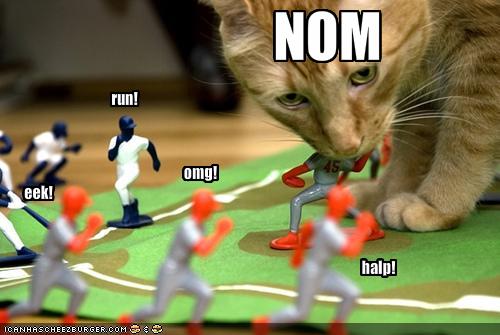The knuckleball is a very effective pitch if you can throw it well. But not many do. Why am I talking about arcane baseball pitches? Because the Internet has a knuckleball problem.

Image from The Complete Pitcher
The Knuckleball Problem
I define the knuckleball problem as something that can be highly effective but is also extremely difficult. The problem arises when people forget about the latter (difficulty) and focus solely on the former (potential positive outcome).
Individuals, teams and organizations embark on a knuckleball project with naive enthusiasm. They’re then baffled when it isn’t a rousing success. In baseball terms that means instead of freezing the hitter, chalking up strikeouts and producing wins you’re tossing the ball in the dirt, issuing walks and running up your ERA.
If a pitcher can’t throw the knuckleball effectively, they don’t throw the knuckleball. But in business, the refrain I hear is ‘X isn’t the problem, it’s how X was implemented‘.
This might be true, but the hidden meaning behind this turn of phrase is the idea that you should always attempt to throw a knuckleball. In reality you should probably figure out what two or three pitches you can throw to achieve success.
Difficulty and Success
The vast majority of pitchers do not throw the knuckleball because it’s tough to throw and produces a very low success rate. Most people ‘implement’ or ‘execute’ the pitch incorrectly. Instead pitchers find a mix of pitches that are less difficult and work to perfect them.
Yet online, a tremendous number of people try to throw knuckleballs. They’re trying something with a high level of difficulty instead of finding less difficult (perhaps less sexy or trendy) solutions. And there is a phalanx of consultants and bloggers who seem to encourage and cheer this self-destructive behavior.
Knuckleballs
In general I think mega menus suck. Of course there are exceptions but they are few and far between. The mega menu is a knuckleball. Sure you can attempt it, but the odds are you’re going to screw it up. And there are plenty of other ways you can implement navigation that will be as or even more successful.
When something has such a high level of difficulty you can’t just point to implementation and execution as the problem. When a UX pattern is widely misapplied is it really that good of a UX pattern?
Personas also seem to be all the rage right now. Done the right way personas can sometimes deliver insight and guidance to a marketing team. But all too often the personas are not rooted in real customer experiences and devolve into stereotypes that are then used as weapons in cross-functional arguments meetings. “I’m sorry, but I just don’t think this feature speaks to Concerned Carl.”
Of course implementation and execution matter. But when you consistently see people implementing and executing something incorrectly you have to wonder whether you should be recommending it in the first place.
Pitching coaches aren’t pushing the knuckleball on their pitching staffs.
Can You Throw a Knuckleball?

The problem is most people think they can throw the online equivalent of the knuckleball. And unlike the baseball diamond the feedback mechanism online is far from direct.
Personas are created and used to inform your marketing strategy and there is some initial enthusiasm and some minor changes but over time people get tired of hearing about these people and the whole thing peters out along with the high consulting fees which are also conveniently forgotten.
The hard truth is most people can’t throw the knuckleball. And that’s okay. You can still be a Cy Young Award winner. Tim Lincecum does not throw a knuckleball.
How (and When) To Throw The Knuckleball
This doesn’t mean you shouldn’t be taking risks or attempt to throw a knuckleball once in a while. Not at all.
However, you shouldn’t attempt the knuckler simply because it is difficult or ‘more elegant’ or the hottest new fad. You can take plenty of risks throwing the slider or curve or change up, all pitches which have a higher chance of success. In business terms the risk to reward ratio is far more attractive.
If you’re going to start a knuckleball project you need to be clear about whether you have a team that can pull it off. Do you really have a team of A players or do you have a few utility guys on the team?
Once you clear that bit of soul searching you need to be honest about measuring success. A certain amount of intellectual honesty is necessary so that you can turn to the team and say, you tossed that one in the dirt. Finally, you need a manager who’s willing to walk to the mound and tell the pitcher to stop futzing with the knuckleball and start throwing some heat.
TL;DR
The Internet has a knuckleball problem. Too many are attempting the difficult without understanding the high probability of failure while ignoring the less difficult that could lead to success.
The Next Post: Query Synonyms
The Previous Post: Google Changed My Title

Comments About The Knuckleball Problem
// 4 comments so far.
Jeff Loquist // December 09th 2011
This is a fantastic analogy and something it takes marketers way too long to learn (if they learn it at all).
Also…is that a gorilla holding a baseball? That is impressive 🙂
AJ Kohn // December 09th 2011
Thank you Jeff and you’re right, far too many marketers and product folks never learn this lesson. They always want to implement the newest and most cutting edge feature even though other feature would likely have a greater chance of success and are often a better fit anyway.
And that dude is hairy isn’t he. It’s almost like Brian Wilson’s beard migrated.
Moises Szarf // December 09th 2011
On a sports related basis, I mean, using a sports analogy to explain an online marketing concept, this is a post I did recently (mind you, the only post I have done on my blog): http://moisesszarf.com/2011/10/biggest-adwords-quality-score-lesson-transition-conversion/
JesseCWalker // July 17th 2012
I love this analogy. I think it applies to almost all get-rich-quick schemes. Sure it’s possible to make niche site that nets 100k its first year. But the guy who did it has unusual stuff.
It is astronomically unlikely that any given person can replicate his feat.
Sorry, comments for this entry are closed at this time.
You can follow any responses to this entry via its RSS comments feed.